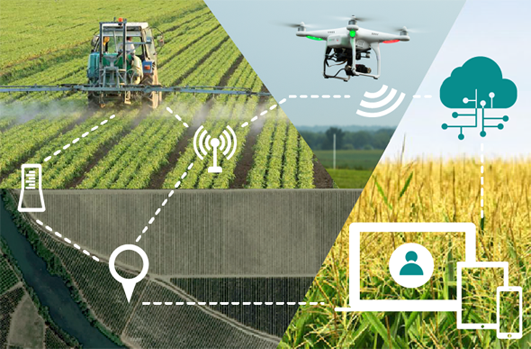Artificial Intelligence (AI) is revolutionizing the agricultural sector, offering innovative solutions to improve efficiency, productivity, and sustainability in farming practices. With AI-powered technologies such as machine learning and computer vision, farmers can make data-driven decisions, optimize resource utilization, and enhance crop yields. This article explores the role of AI in agriculture, its applications, and the transformative impact it has on modern farming practices.
Applications of AI in Agriculture
- Precision Farming: AI enables precision agriculture techniques by analyzing data from satellites, drones, and sensors to monitor crop health, soil conditions, and weather patterns. This data-driven approach allows farmers to optimize irrigation, fertilization, and pest control, resulting in higher yields and reduced environmental impact.
- Crop Monitoring and Management: AI-powered systems can analyze images of crops captured by drones or satellites to detect diseases, pests, and nutrient deficiencies. By identifying potential issues early, farmers can take proactive measures to mitigate risks and protect crop health.
- Autonomous Farming Equipment: AI-driven autonomous tractors, harvesters, and robots are revolutionizing farm operations by automating repetitive tasks such as planting, harvesting, and weeding. These smart machines use sensors and algorithms to navigate fields, perform tasks with precision, and optimize resource usage.
- Supply Chain Optimization: AI optimizes the agricultural supply chain by forecasting demand, managing inventory, and streamlining logistics. AI-powered algorithms analyze market trends, consumer preferences, and weather forecasts to ensure timely delivery of products and reduce food waste.

Benefits of AI in Agriculture
- Increased Productivity: AI-driven technologies enhance productivity by optimizing farming practices, reducing resource wastage, and improving crop yields. This leads to higher profitability for farmers and ensures food security for growing populations.
- Sustainability: AI promotes sustainable farming practices by minimizing chemical usage, conserving water resources, and reducing environmental impact. By optimizing inputs and minimizing waste, farmers can cultivate crops more efficiently while preserving natural ecosystems.
- Data-Driven Decision-Making: AI provides farmers with valuable insights and recommendations based on real-time data analysis. By leveraging AI algorithms, farmers can make informed decisions about crop management, resource allocation, and risk mitigation strategies.
- Innovation and Adaptation: AI fosters innovation in agriculture by enabling the development of new technologies and solutions to address emerging challenges. From climate change resilience to precision agriculture, AI-driven innovations empower farmers to adapt to changing environmental and market conditions.
Challenges and Considerations
- Data Quality and Accessibility: The success of AI in agriculture depends on access to high-quality data from diverse sources. However, challenges related to data collection, standardization, and accessibility may hinder the effectiveness of AI solutions, especially in rural areas with limited connectivity.
- Technology Adoption and Skills Gap: The adoption of AI technologies in agriculture requires investment in infrastructure, training, and capacity building. Farmers need access to training programs and support services to effectively utilize AI tools and maximize their benefits.
- Ethical and Regulatory Issues: AI applications in agriculture raise ethical concerns related to data privacy, algorithm bias, and intellectual property rights. Clear regulations and ethical guidelines are needed to ensure responsible use of AI and protect farmers’ rights.
Conclusion
Artificial Intelligence holds immense promise for transforming agriculture into a more efficient, sustainable, and resilient industry. By leveraging AI technologies, farmers can optimize resource management, improve crop yields, and adapt to evolving market dynamics. As AI continues to advance, its role in agriculture will become increasingly vital in addressing global food security challenges and building a more sustainable future for agriculture.
Share this article


